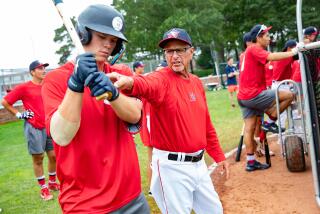Scout Has Good Eye for a Good Arm
- Share via
SAN DIEGO — Ray Boone, sitting quietly among the parents and other spectators at a high school baseball game, is surrounded by the constant chatter of neighborhood gossip and parental boosterism.
A couple of times each inning, a big play or the loud crack of the bat commands the spectators’ undivided--and undistracted--attention.
Most of the time, Ray Boone’s attention is spread over everything. He notices the way a player swings his bat while on deck and the way he reacts to a strikeout. Such seemingly unimportant things keep Boone scribbling in his note pad.
Boone is a major league baseball scout--a purveyor of talent and a salesman of sorts for the Boston Red Sox. To many young baseball players who have dreamed of playing in the big leagues, Boone is the gatekeeper to the pros.
Boone, 63, knows what it’s like to dream of a major league career. He also knows what it’s like to realize that dream. Boone played professional baseball for 12 1/2 years. He played in two World Series and was twice an American League All-Star.
Boone, who played for Cleveland, Detroit and Boston, has nowbeen scouting for 26 years. His territory area is California south of Laguna Beach and all of Arizona and New Mexico.
Boone has driven thousands of miles and sat through countless ballgames from the preps to the pros. It is a year-round job, taking him to high schools and colleges in the spring, minor league and Padre games in the spring and summer and high school and college development leagues in fall and winter.
“You can’t scout if you don’t go to games,” Boone said. “Some days, I might watch a high school game in the afternoon then go see a college game that evening.
“A scout has to be a hard worker, a guy who sees ball games and isn’t afraid to drive a lot of miles,” said Boone, who estimated that he drives about 32,000 miles a year for his job and usually sees at least one game Monday through Saturday in an average week during the school year.
Boone’s work day usually begins in the early afternoon, arriving at the game an 1 1/2 hours early to watch warmups and infield practice.
“I can’t miss infield,” he said. “The most important thing for the kids is to warm up real good. I want to see them throw from the outfield.
“I don’t worry if a kid gets four hits in a game. I want to see the basic tools--his arm, his swing and his fielding. I want to know if this kid can improve. A kid can’t go out there and be lackadaisical and flip the ball around and think somebody is going to be interested.
“He has to show me his ability instead of just going through the motions.”
When concentrating on a particular player, Boone, who has scouted only for the Red Sox, said he tries to envision “Boston” stitched across the front of the player’s uniform. The word doesn’t always fit.
“A kid may be hitting .550, but you know he can’t play for you,” he said. “In your mind, you know he won’t be a major league ballplayer.
“When I’m looking at a prospect I try and look five years down the road, look at his age, his build and decide how much he will fill out.”
Mental toughness is another factor, said Boone. Most players drafted out of high school and college begin by playing for one of the organization’s low minor league teams.
One of the toughest things a young player has to deal with is adjusting to life in the minors, Boone said. Some players don’t realize that the minors don’t provide the major league luxuries.
“I tell all my players when I sign them, ‘The ‘rah rah’ time is over. This is gonna be your job now. These fans in the minor league parks are going to see you foul up and boo you, and they aren’t going to care that you’re some 17-year-old kid just out of high school,” he said.
“That’s where you separate the men from the boys. You can take an athlete out of San Diego and he might think he’s all-world there. But then he goes out to play for some pro team and finds out there are a lot of other guys out there who are all-world. . . . They get out of San Diego and see kids from all over who are top quality and it’s a rude awakening.
“They find out it’s not going to be easy out there, and it shouldn’t be.”
Some of the players, already dealing with the difficulty of being away from their family for the first time, have a hard time coping with the realities of professional baseball on the lower levels, Boone added, saying that he has seen “lots of skeletons along the path.”
“When I’m interested in a kid, I’ll ask him ‘Are you going to school or are you going to play pro ball?’ ” he said. “I tell them the opportunity to play pro ball doesn’t come along every day of the week.”
Boone knows what it’s like to be a parent bothered by scouts. His son, Bob Boone of the California Angels, was recruited heavily while earning All-CIF honors at Crawford High. Bob Boone opted not to sign with a professional team and attended Stanford University where he eventually graduated.
“I was happy with the choice Bob made because it was his choice,” Boone said. “In his case it was the right one.”
Although Boone said his job is anything but boring after 26 years, some of the excitement among scouts jockeying for a player’s attention has been diminished with the draft system. With the draft, the teams with the poorest record the previous season have the top picks in the draft.
Boone said he knows the best players will be picked in the opening round of the draft, and because the Red Sox usually manage to finish with a decent record, he knows the organization won’t be able to chose the No. 1 players.
Before the draft was initiated in the mid-1960s, scouts would flock to a top prospect’s final game of the year in hopes of signing the player, Boone said.
Although scouts are still a secretive bunch, in the pre-draft days, the competition for the best players left scouts relaying inaccurate information about players to other scouts in order to draw their attention away from that particular player, Boone said.
He recalled how scouts would flock to a top prospect’s house and set up appointments with the player’s parents to talk about signing with their team. The appointments would begin around 5 p.m. in the evening and continue in 30-minute intervals until all the scouts had a chance to talk to the parents.
“When you had it in good with the parents, you usually went last,” he said. “By that time you knew the price you had to beat.”
These days, scouts can rely on the central scouting service, which submits to each ball club reports on the top players. The central scouting service makes it easier for Boone to keep informed about some of the outlying areas in New Mexico and Arizona that he can’t reach on a regular basis.
Now, the Red Sox’s 25 full-time scouts rank what order the players should be picked in the draft. Out of all the players who fall under each scout’s jurisdiction, usually 10 to 20 will be chosen for consideration by the team.
Boone said it’s important for a scout to judge what round a player will be picked. He will go down his list of players and decide which should play in the Triple-A, Double-A or A level. The final choice is made in Boston, but Boone said the front office can trust his judgment after all these years.
Many of Boone’s colleagues use devices to aid them in their scouting. Speed guns are a favorite in testing a pitcher’s talent. Some scouts will videotape players they are interested in. Some will even carry tape recorders and record their thoughts about a player right after a game.
Boone said he prefers the traditional method. He said that he likes to sit in the grandstands and blend in with the crowd. He keeps a list of the players he is interested in and makes notes on specific aspects of their play--swing, arm or hustle--that catches his attention.
“I just go by my notes,” he said. “I never used a speed gun. I don’t need a speed gun, It’s not that I’m brilliant, but I can see when a kid is throwing hard; I don’t need to see that he’s throwing 90 miles per hour.”
Despite the skill Boone has acquired in his years of scouting, he still can’t judge the factor most important in young ballplayers--heart.
“We (scouts) are not geniuses,” he said. “We look at the same top prospect who has a good arm, hits with power, etc. But there is no way to look inside a fellow and see what kind of heart he has.
“A lesser guy may make it to the big leagues because he has toughness to make it through the minor leagues. It is hard for us to know, though, whether a kid has what it takes inside. I don’t care how good of a scout you are, you still can’t see what kind of a heart a kid has.”
More to Read
Go beyond the scoreboard
Get the latest on L.A.'s teams in the daily Sports Report newsletter.
You may occasionally receive promotional content from the Los Angeles Times.










